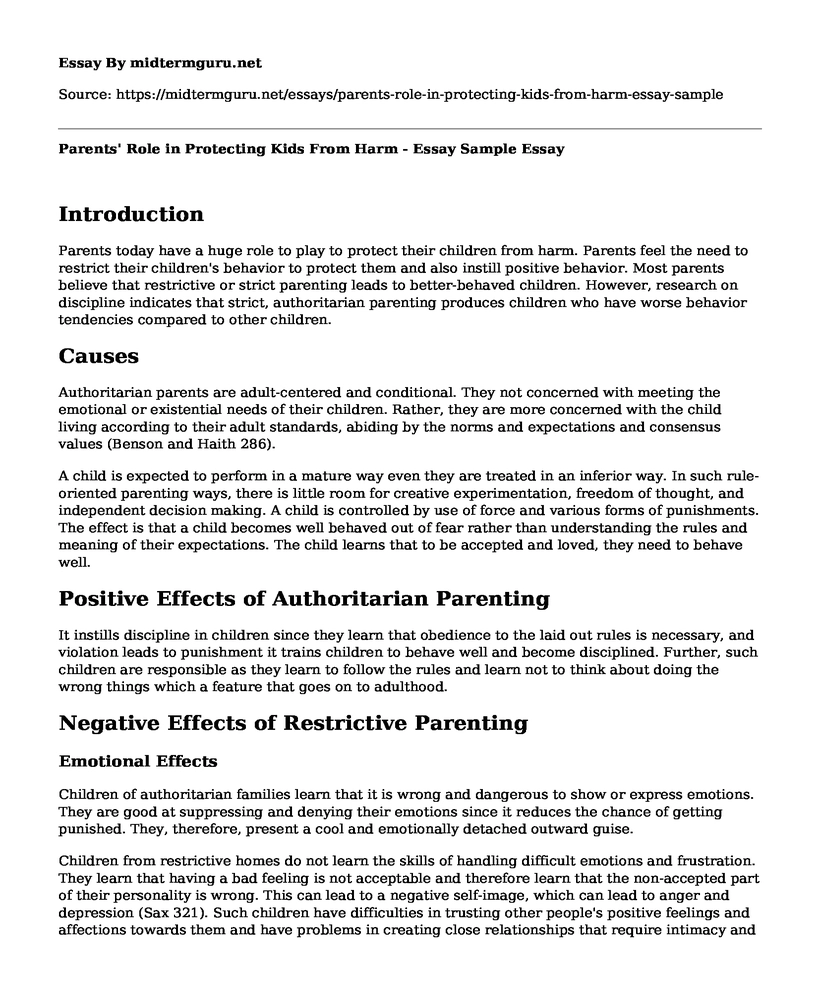Introduction
Parents today have a huge role to play to protect their children from harm. Parents feel the need to restrict their children's behavior to protect them and also instill positive behavior. Most parents believe that restrictive or strict parenting leads to better-behaved children. However, research on discipline indicates that strict, authoritarian parenting produces children who have worse behavior tendencies compared to other children.
Causes
Authoritarian parents are adult-centered and conditional. They not concerned with meeting the emotional or existential needs of their children. Rather, they are more concerned with the child living according to their adult standards, abiding by the norms and expectations and consensus values (Benson and Haith 286).
A child is expected to perform in a mature way even they are treated in an inferior way. In such rule-oriented parenting ways, there is little room for creative experimentation, freedom of thought, and independent decision making. A child is controlled by use of force and various forms of punishments. The effect is that a child becomes well behaved out of fear rather than understanding the rules and meaning of their expectations. The child learns that to be accepted and loved, they need to behave well.
Positive Effects of Authoritarian Parenting
It instills discipline in children since they learn that obedience to the laid out rules is necessary, and violation leads to punishment it trains children to behave well and become disciplined. Further, such children are responsible as they learn to follow the rules and learn not to think about doing the wrong things which a feature that goes on to adulthood.
Negative Effects of Restrictive Parenting
Emotional Effects
Children of authoritarian families learn that it is wrong and dangerous to show or express emotions. They are good at suppressing and denying their emotions since it reduces the chance of getting punished. They, therefore, present a cool and emotionally detached outward guise.
Children from restrictive homes do not learn the skills of handling difficult emotions and frustration. They learn that having a bad feeling is not acceptable and therefore learn that the non-accepted part of their personality is wrong. This can lead to a negative self-image, which can lead to anger and depression (Sax 321). Such children have difficulties in trusting other people's positive feelings and affections towards them and have problems in creating close relationships that require intimacy and emotional honesty in the future. They also become stressed due to having critical parents who always pass uncompromising judgment. Such children also develop self-guilt and shame due to being punished.
Social Effects
Children from restrictive families can be forced to become bullies as they tend to believe that brute force is power and is attractive. They can bully others into getting respect, authority, and obedience.
Authoritarian parenting styles cause their children to believe in hierarchical behavior patterns which translate to poor socializing skills. Such children learn to be submissive to authority and also more affected by peer pressure.
Existential Effects
Children from authoritative families have low self-esteem and inferiority complexes because they feel that they are not being seen or heard. They have low self-worth since they feel they are only loved when they do as they are expected. They also do not have the skills to listen to their intuition. They also take a passive role in their life and tend to be submissive to leaders and authority. They are less likely to engage in creative experimentation due to the attitude of facing punishments due to their behaviors (Bjorklund 536).
Conclusion
Restrictive parenting that portrayed by authoritative parents instills discipline and a sense of responsibility in children. However, it has more negative effects on children such as limiting their creativity and experimentation, rendering them unable to make their life decisions, they have low self-esteem and self-worth and other issues that they carry to their adult life.
References
Benson, Janette B, and Marshall M. Haith. Social and Emotional Development in Infancy and Early Childhood. London: Academic, 2009. Internet resource.
Bjorklund, David F. Child & Adolescent Development: An Integrated Approach. Australia: Wadsworth Cengage Learning, 2012. Print.
Sax, Leonard. The Collapse of Parenting: How We Hurt Our Kids When We Treat Them Like Grown-Ups : the Three Things You Must Do to Help Your Child or Teen Become a Fulfilled Adult. , 2016. Internet resource.
Cite this page
Parents' Role in Protecting Kids From Harm - Essay Sample. (2023, Feb 03). Retrieved from https://midtermguru.com/essays/parents-role-in-protecting-kids-from-harm-essay-sample
If you are the original author of this essay and no longer wish to have it published on the midtermguru.com website, please click below to request its removal:
- Essay Sample: Ethical and Legal Dilemma
- Why I Deserve a Good Grade in English - Essay Sample
- How I Made the Most Out of the Opportunities I Have Come Across in My Life So Far?
- Paper Example on Family Demography, Dynamics, and Concepts
- Essay Sample on Dramaturgical Society
- Gender Stereotyping: Common Practice, Devastating Impact - Essay Sample
- Jessica's Frustration: Battling Unfulfilled Dreams in a CNA Job - Essay Sample







